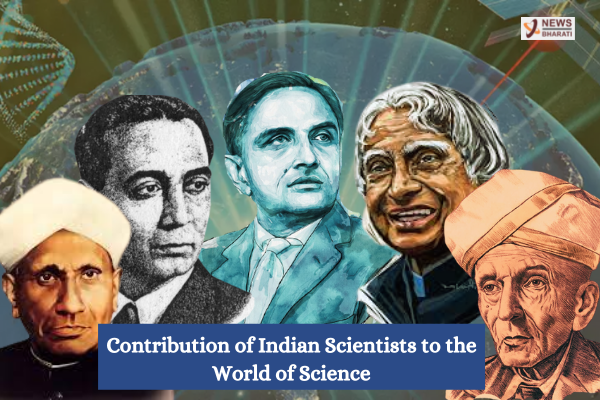Contribution of Indian Scientists to the World of Science
India has been home to scientific developments and is regarded as one of the most ancient country to have excelled in this field.
Total Views |
-Priti Naik
With Vedic traditional inventions to new technological advancements, science has evolved as a force of modernity and innovation. India has been home to scientific developments and is regarded as one of the most ancient country to have excelled in this field. India has rightfully owned the status of being one of the most ancient countries to have discovered path breaking developments in science and technology.

Undoubtedly, Indian scientists had paved the path for modern science way before it was even established. If we have a closer look and understanding of the discoveries by our scientist, we can known that many theories that they advocated and the techniques discovered had created and strengthened the fundamentals of modern science. Intellects like Vikram Sarabhai, APJ Abdul Kalam, CV Raman, Homi J Bhabha and many more have contributed immensely to the entire world. Their theories and research are still been studied and applied in modern science and we feel honoured and proud to belong to a country like India who has traditional customs, traditions and techniques grounded to her roots.
Vikram Sarabhai
Indian Space Research Organisation (ISRO) has been doing wonders and thanks to Vikram Sarabhai who has been rightly termed as the Father of India’s Space Programme for setting up the organization. Vikram Sarabhai, not just was responsible for educating India about the importance of space programme he was also a major driving force for the establishments of Indian Institute of Management, Ahmadabad (IIM-A), an institute which has a high academic repute.
APJ Abdul Kalam
India’s most loved President Avul Pakir Jainulabdeen Abdul Kalam (APJ Abdul Kalam had worked as an Aerospace engineer with India’s Defence Research and Development Organisation (DRDO) and Indian Space Research Organisation (ISRO). With his vision at par, Kalam had set a goal of meeting around 100,000 students in 2 years after his resignation as scientific advisor in 1999.
Sir Mokshagundam Visvesvaraya
India celebrates Sir Visvesvaraya’s birthday as Engineer’s Day, honouring his great marvels in engineering. He has credit of inventing the ‘automatic sluice gates’ and ‘block irrigation system’. Not just this but back in 1895, when river beds were costly, Visvesvaraya came up with this unique and efficient way of filtering water through ‘Collector Wells’ which was rarely known to the world.
Homi Jehangir Bhabha
Bow down to this great thinker who played a crucial role in Quantum Theory, Homi Jehangir Bhabha was the one who convinced India to start the ambitious nuclear program. A very rare known fact about Bhabha was that although he was considered as the father of Indian nuclear power, he was against India manufacturing atomic bombs. Instead he had suggested the production of atomic reactors to be used to lessen India’s misery and poverty.
C V Raman
Chandrashekhar Venkata Raman was the one who played a pioneer role in the work of understanding scattering of light. CV Raman had discovered that when light navigates through a transparent material, some of the deflected light changes in its wavelength. He was the first non –white and first Asian to have won any Nobel Prize in the field of Science.
S Chandrashekhar
Are you a mathematical geek? You must be well aware of Chandrashekhar Limit. The man behind the mathematical theory of black holes, S Chandrashekhar was awarded the Nobel Prize for Physics, in 1983. He is well known for his contribution related to concerns the radiation of energy from stars. This was in particular with the white dwarf stars, which are studied to be the dying fragments of stars.
Meghnad Saha
Known for his best work in the thermal ionization of elements, Meghnad Saha made it easy for future generation by formulating the Saha equation. Not just this he also invented an instrument to measure the weight and pressure of solar rays. Meghnad Saha played an important role in preparing the original plan for Damodar Valley Project and was also the chief architect of river planning in India.
Not only these, there are many other scientist as well who have contributed immensely to the world of science. Recalling and honouring their contribution will enhance our presence on the international platform but also blending ancient science with new technology will help India create more science wonders!
VVM 2021-22 is coming up with a unique opportunity for registered participants this year.
The Mega Nation-Wide Experiment is a novel endeavour of VVM. The objectives this mega experiment are inculcating observational skills, a scientific mindset, and analytical thinking among our students.
REGISTER NOW at bitly.com/vvm-explore
The Mega Nation-Wide Experiment is a novel endeavour of VVM. The objectives this mega experiment are inculcating observational skills, a scientific mindset, and analytical thinking among our students.
REGISTER NOW at bitly.com/vvm-explore